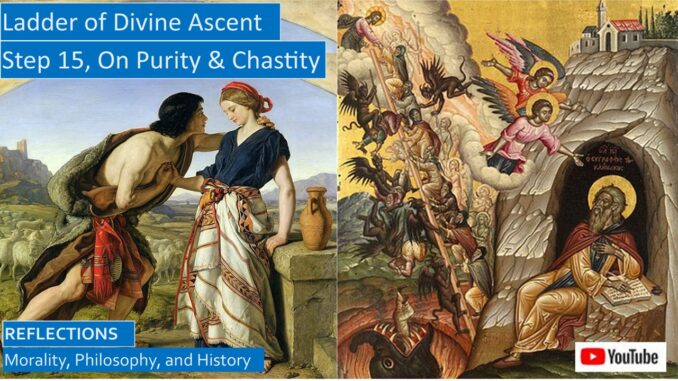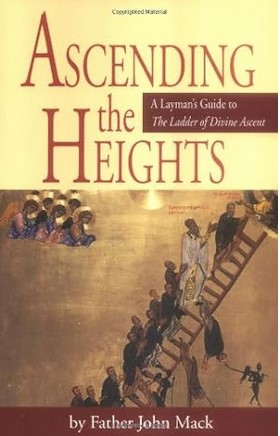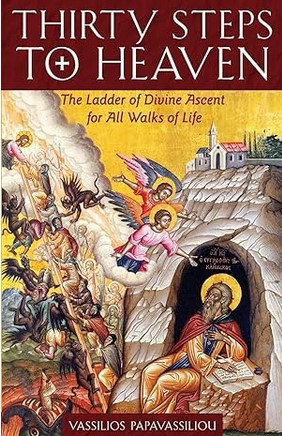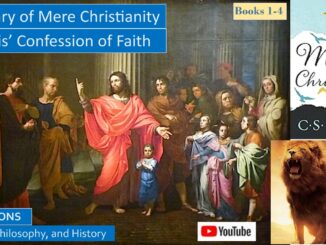
How can those who are single live a chaste and pure life? How can those who marry be chaste and pure?
Before we marry, is love always lust? After we marry, is lust always love?
What is the deeper meaning of love? How do you distinguish carnal and passionate love from divine love?
What is the deeper meaning of chastity and purity?
YouTube video for this blog: https://youtu.be/YOlrP6-6YP0
HOW LAYMEN SHOULD INTERPRET THIS MANUAL FOR MONASTICS
The Ladder of Divine Ascent is a classic monastic work written by St John Climacus for his fellow monastics in the seventh century, centuries before Emperor Constantine started the transformation of the Roman Empire into a Christian Empire. In Step 15 of the Ladder on Chastity and Purity, some commonsense allegorizing is necessary to apply his teachings to laymen.


In the first step of the ladder, St John Climacus states that “some people living carelessly in the world have asked me:
‘We have wives and are beset with social cares, and how can we lead the solitary life?’
I replied to them: ‘Do all the good you can; do not speak evil of anyone; do not steal from anyone; do not lie to anyone; do not be arrogant to anyone; do not hate anyone; do not be absent from the Divine Services; be compassionate to the needy; do not offend anyone; do not wreck another man’s domestic happiness, and be content with what your own wives can give you. If you behave in this way, you will not be far from the Kingdom of Heaven.’ “[1]
Laymen benefit from studying the monastic classics like the Ladder of Divine Ascent, because living the Christian life is itself a type of monastic calling.
John Climacus: First Step of the Ladder of Divine Ascent
http://www.seekingvirtueandwisdom.com/st-john-climacus-first-step-on-the-ladder-of-divine-ascent/
https://youtu.be/Fco0W3bt5GA
St John Climacus sees the Christian life as progressing up the Ladder of Divine Ascent, beginning with a rejection of the selfishness of the world, then the importance of obeying the Lord’s commandments, and the godly injunctions of the church and those in authority, repentance and perseverance through the trying times of our lives.


St John Climacus, Ladder of Divine Ascent, On Detachment, Exile, and Pilgrimage, Steps 2 and 3
https://seekingvirtueandwisdom.com/st-john-climacus-ladder-of-divine-ascent-on-detachment-exile-and-pilgrimage-steps-2-and-3/
https://youtu.be/qDtrgYmaAQU
Ladder of Divine Ascent, St John Climacus, Rung 4 on Obedience
https://seekingvirtueandwisdom.com/ladder-of-divine-ascent-st-john-climacus-rung-4-on-obedience/
https://youtu.be/_bjQcNvzb-c
St John Climacus: Ladder of Divine Ascent, Step 5, Repentance, and Perseverance of Winston Churchill
http://www.seekingvirtueandwisdom.com/st-john-climacus-ladder-of-divine-ascent-step-5-repentance-and-perseverance-of-winston-churchill/
https://youtu.be/NiuWNsy4x4Q
Ladder of Divine Ascent, Remembrance of Death, Joy Making Mourning, and Despondency, Steps 6,7, & 13
https://seekingvirtueandwisdom.com/ladder-of-divine-ascent-remembrance-of-death-joy-making-mourning-and-despondency-steps-67-13/
https://youtu.be/pFwC2nDf1CQ
We are then reminded that we should be free from anger, not holding grudges for the wrongs we suffer, and the strength of meekness. In the next step, we combat slander, lying, and gossip. We combat the passions of gluttony by moderate living and fasting, followed by following a life of purity and chastity in this fifteenth step of the Ladder. In the next step, we will combat the passion of avarice and greed.
St John Climacus, Ladder of Divine Ascent, Freedom from Anger, Meekness, Remembrance of Wrongs, Steps 8 and 9
https://seekingvirtueandwisdom.com/st-john-climacus-ladder-of-divine-ascent-freedom-from-anger-meekness-remembrance-of-wrongs-steps-8-and-9/
https://youtu.be/2mEjh425sJk
St John Climacus in Ladder of Divine Ascent on Lying, Talkativeness, and Slander, Steps 10, 11 and 12
http://www.seekingvirtueandwisdom.com/st-john-climacus-in-ladder-of-divine-ascent-on-lying-talkativeness-and-slander-steps-10-11-and-12/
https://youtu.be/SLBIdDHRy3A
St John Climacus on Gluttony and Fasting, Ladder of Divine Ascent, Step 14, and Eating for Health: DASH diet
https://seekingvirtueandwisdom.com/eating-for-health-dash-diet-st-john-climacus-on-gluttony-and-fasting-in-ladder-of-divine-ascent/
https://youtu.be/KM0eMjE1fXc
Laymen often wonder: How can those who are married be chaste? In his commentary on the Ladder of Divine Ascent, Father Vassilios Papavassiliou teaches us that “people tend to think of chastity in purely sexual terms as the virtue opposed to sexual depravity.” But just as the word concupiscence has a deeper meaning for Catholics, chastity has a deeper meaning for Orthodox Christians. “In the Orthodox marriage service, we pray that the newlyweds may live in chastity. But yet in the same service, we pray numerous times that they may have honorable children. How can a couple live in” “sexual purity, and yet have children?”
The simple answer is that chastity and sexual purity are not exactly the same. He points out that “a fuller, more accurate translation of the Greek term sphrosini is whole-mindedness, or harmony between the flesh and the spirit.” Father Vassilios teaches us that in the Church “the intimate union between husband and wife is a living symbol of the union between Christ, the Bridegroom, and the Church, His Bride,” which is why intimacy should be experienced by a man and his wife.
St John Climacus indeed has an expanded view of purity:
Step 15.36. “Purity is the fellowship with and likeness to God, so far as is possible with men.”
Step 15:3. “Chastity is the name which is common to all the virtues.”
As St Paul reminds us, love is the greatest virtue. As Jesus, quoting Deuteronomy, the core of our faith is to Love God with all of our heart and with all of our mind and with all of our soul, and to Love our neighbor as ourselves.
Hillel and Jesus, Reflections on Rabbi Telushkin’s Observations
http://www.seekingvirtueandwisdom.com/hillel-and-jesus-reflections/
Comparing Hillel and Shammai to Jesus
http://www.seekingvirtueandwisdom.com/comparing-hillel-and-shammai-to-jesus/
More Stories and Sayings of Hillel and Shammai
http://www.seekingvirtueandwisdom.com/more-stories-and-sayings-of-hillel-and-shammai/
Jesus, Hillel, and Shammai, Loving God and Neighbor
https://youtu.be/ygxn2qqGnOI
Love of God and neighbor is far more important than mere religious observance, as St John Climacus reminds us:
Step 15.88. “If I bind” Satan, the Great Deceiver, “by fasting, by condemning my neighbor I am handed over to him again.”
St John Climacus warns against self-love:
Step 15.90. “And the flesh may say to my soul:” “I have my father within me: self-love.”
The Eastern Church Fathers, St Augustine, Andrew Nygren, and many others warn us against the evils of self-love, we should strive to be selfless rather than selfish towards our neighbor. We must not confuse this classical self-love with the modern advice to take care of ourselves. We plan more reflections on the dangers of self-love.
MARRIAGE AND INTIMACY, PHYSICAL AND EMOTIONAL
Personally, I dislike the common usage of the word sex, its usage often cheapens relationships, I prefer the word intimacy. In the Hebrew and in the transliteral translations of Leviticus, multiple commandments say THOU SHALT NOT UNCOVER THE NAKEDNESS OF anyone who is not your wife, and this is not a doctrinal issue since these same commandments in Exodus use concise words that are similar to English usage that mean having sex with, in more or less vulgar or clinical terms. This language in Leviticus emphasizes that even illicit and immoral physical relationships can lead to either deep emotional attachments, or deep emotional resentments, and trauma, so we always prefer to use the phrase, being physically intimate, because this also suggests that the cousin of physical intimacy is emotional intimacy in a caring relationship.
Our Reflections on Morality, Philosophy, and History: Ancient and Modern Classics
http://www.seekingvirtueandwisdom.com/our-philosophy-for-this-blog-reflections-on-ancient-and-modern-classics/
https://youtu.be/Si0TsO5bNr0
St John Climacus warns us:
Step 15.43. “He who commits fornication sins against his own body.”
Step 15.46. “When the devil wishes to tie two people to each other by a shameful bond, he works on the inclinations of both of them, and then lights the fire of passion.”
In contrast, Father John Mack, in his commentary on the Ladder of Divine Ascent, speaks of marriage of a type of transfiguration, which recalls Christ’s Transfiguration:
“In Christian marriage,” physical intimacy “becomes part of the transfiguration process. We deal with our bodily passions first by containing them within the confines of marriage. If our physical passion is a wild animal, then marriage in which the wild animal is restrained.” Physical intimacy is “no longer the goal; it is the relationship of” divine “love which becomes the focus,” “a love that both gives and receives, which finds joy in bringing joy to one another, of experiencing freedom in the context of absolute commitment.”
A classic painting depicts both the divine and passionate love that Jacob felt for his beloved gazelle, Rachel, the daughter of his kinsman Laban whom he met at the well. The Old Testament recounts that he agreed to labor for seven years for the hand of Rachel, but the seven years were but a day, so deep was his love for her.
But on his wedding night, Laban and Jacob got so drunk that, when Laban switched Rachel for Leah, his dutiful cow, Jacob did not notice the switch until morning. This is one of the mysteries of Holy Scripture: How could Jacob not notice who he was sleeping with? But that morning Laban gave him Rachel’s hand also, but he was compelled to work another seven years for Leah. So even in the Holy Scriptures, carnal love is intertwined with divine love.
Father Vassilios observes that “in biblical times, couples were often married by the age of fourteen. Premarital sex in biblical times was practically impossible, for by the time sexual impulses kicked in, a man and woman were already married.”
This may have been true for girls in the ancient world, but often they married much older men. Indeed, in the traditional Nativity account, Mary, the Theotokos, was married when she was fourteen. But Joseph was much older than she was.
Likewise, it was common in ancient Greece for a man to marry when he became established in his thirties, and he would often marry a young girl. In ancient and Christian Rome, many Christian women were usually uneducated and illiterate, and likely many more women married young than they do today.[2] But we must remember that ancient accounts best described what life was like for the small percentage of the population who lived in ancient cities, very little is known on what life was like for the great majority of people who lived in the ancient countryside and farms.
SPIRITUAL DANGER OF PHYSICAL INTIMACY
There is a spiritual danger in allowing the yearning for physical intimacy to become the center of our lives. Jesus exhorts us: “Everyone who looks at a woman lustfully has already committed adultery with her in his heart.”[3]
Likewise, St John Climacus warns us:
Step 27. “In sensual people, there is a love for the body, and a shameless and inhuman spirit which” ignites “a feeling of physical pain in the heart, fierce as from a blazing furnace. As a result, the sufferer does not fear God, despises the remembrance of Hell as of no consequence, and disdains prayer.” “He is like someone out of his mind and in a trance, perpetually drunk with desire for creatures, rational and irrational.”
Certainly, this is a greater danger for anyone in a casual relationship, where no commitments have been made, and is a greater danger for the young than for the old. We must remember that St John Climacus is addressing his fellow monks, and those who are married may ask themselves: What is wrong with a married couple who are “perpetual drunk with desire” for each other? Perhaps this is the wrong question, perhaps the question should rather be: Is this spiritually wise? You should never expect hot passion to last for years after the honeymoon. Eventually, it should mature into a more compassionate dispassionate love. Perhaps we should always be on our guard and be repentant, questioning whether we are treating our spouse with dignity, treating her as a person rather than as an object.
Many people have a shallow understanding of intimacy, they believe that it is harmful when there is no commitment between lovers, such as a marriage bond, but that it is always healthy and wholesome after the honeymoon. Certainly, commitment is critical, but sometimes unbound lovers show more commitment to one another than many married couples, and some marriages are nothing more than a two-person brothel.
St John Climacus warns us:
Step 15.50. “Do not be ignorant.” “I have seen men, who in reality were moved by the spirit of fornication, pray with all their soul for their loved ones, while believing that they were fulfilling the law of love.”
We must remember that St John Climacus is addressing fellow monastics with his advice. How valid is this advice for those who are happily married? Have we ourselves, or couples we have known, experienced a true divine love that sprouts from their passionate love? How many marriages follow the path of the 2011 Friends with Benefits, where these casual friends fall in love and dedicate themselves to each other in marriage? Can marriage cure concupiscence?
St John Climacus marvels at:
Step 15.60. One kind man, who “on seeing a beautiful woman, thereupon glorified the Creator; and from that one look, he was moved to the Love of God and to a fountain of tears. And it was wonderful to see how what would have been a cause of destruction for one was for another the supernatural cause of a crown. If such a person always feels and behaves in the same way on similar occasions, then he has risen immortal before the general resurrection.”
Is St John Climacus here giving me permission to enter the line in the grocery store that has the cashier who is the prettiest?
Above all, we should heed St John of the Cross when he teaches us that we should choose as our best friends those whose friendship strengthens our Love for God. St John of the Cross was also writing for monastics, but his advice applies particularly to couples who marry. After all, Jezebel was perhaps the most caring wife in the Old Testament, but it was all for naught, since she led her husband Ahab into the sins of envy, theft, and murder when she seized Naboth’s vineyard for him.
St John of the Cross, Dark Night of the Soul, Seven Capital Sins and Best Type of Close Friend
https://seekingvirtueandwisdom.com/st-john-of-the-cross-dark-night-of-the-soul-seven-capital-sins-and-best-type-of-close-friend/
https://youtu.be/DgL7Y5pIFAU
St John Climacus echoes the Platonic contrast between carnal love and divine love:
Step 15:2. “He is pure who expels fleshly love with divine love, and who has extinguished the fire of passion by the fire of Heaven.”
Plato and Xenophon, who both wrote differing versions of the Symposium, or dinner party where Socrates delivers speeches on live, explore how divine love transcends passionate or carnal love, how carnal love can be elevated to divine love, and also how carnal love can be manipulative. His star student Alcibiades, who played such a leading role in the Peloponnesian Wars, was drunk when he crashed the dinner party, proclaiming his carnal love for Socrates, and how Socrates refused, returning a more virtuous divine love.
In Plato’s other great dialogue on love, Socrates turns Phaedrus away from the manipulative seducing love of his male suitor and provides a vision of the much superior divine love in his famous allegory of the chariot driven by a mortal carnal steed and the noble divine immortal steed.
Xenophon and Plato, Socratic Dialogue, Symposium, Romantic and Carnal Love, Part 1
https://seekingvirtueandwisdom.com/xenophon-and-plato-socratic-dialogue-symposium-romantic-and-carnal-love-part-1/
https://youtu.be/OIe5pn2S1Ls
Xenophon and Plato, Socratic Dialogue, Symposium, Divine and Noble Love, Part 2
https://seekingvirtueandwisdom.com/xenophon-and-plato-socratic-dialogue-symposium-divine-and-noble-love-part-2/
https://youtu.be/z6X3pwVTdrc
Plato’s Dialogue of Phaedrus on Carnal Love and Rhetoric, Part 1
https://seekingvirtueandwisdom.com/platos-dialogue-of-phaedrus-on-carnal-love-and-rhetoric-part-1/
https://youtu.be/JFw5ThfwUAg
Plato’s Dialogue of Phaedrus on Divine Love and the Heavenly Chariot, Part 2
https://seekingvirtueandwisdom.com/platos-dialogue-of-phaedrus-on-divine-love-and-the-heavenly-chariot-part-2/
https://youtu.be/BOtavup_N4g
In a lesser Platonic dialogue, Socrates explores the seedy side of love in his dialogue with Lysis, who is among the young boys ogled by old men at the gymnasium. But Plato’s Socrates again explores friendship, leadership, and divine love in his dialogue Alcibiades 1.
The Lutheran theologian Anders Nygren explores erotic love and Agape, or divine love, first in the Gospels and the Pauline Epistles, then in the Platonic dialogues.
Lysis, Platonic Dialogue on Love and Friendship, Where Old Men Ogle Boys at the Gymnasium
https://seekingvirtueandwisdom.com/lysis-platonic-dialogue-on-love-and-friendship-where-old-men-ogle-boys-at-the-gymnasium/
https://youtu.be/HrSZ5SPUZ7Y
Platonic Dialogue Alcibiades 1, On Friendship, Leadership, and Love
https://seekingvirtueandwisdom.com/platonic-dialogue-alcibiades-1-on-friendship-leadership-and-love/
https://youtu.be/WbCARvApLNk
Anders Nygren, On Christian Agape-Love and Eros-Love in Gospels and Pauline Epistles
https://seekingvirtueandwisdom.com/anders-nygren-on-christian-agape-love-and-eros-love-in-gospels-and-pauline-epistles/
https://youtu.be/KniBalQMemM
Summary of Platonic Dialogues on Love and Friendship, With Commentary by Copleston and Anders Nygren
https://seekingvirtueandwisdom.com/summary-of-platonic-dialogues-on-love-and-friendship/
https://youtu.be/cjXRXQc6Ff4
In the Divine Ascent of the Decalogue:
- We first make our thoughts be pleasing to God.
- Then we make our words be pleasing to God, showing reverence to God and kindness to our neighbor.
- Then we make our deeds be pleasing to God, and where chastity is concerned, may we not use others for our pleasure, but rather place their wellbeing before our own.
St John Climacus in Step 15.74 describes the progression of purity, which can either be an ascent or a descent, depending on whether the love is selfless, or selfish:
- First, we suffer the assault by the passions, often by the demons, or in the modern world, by hormones.
- Then we converse about our stirred passions with others, or in our hearts, with either passion or dispassion.
- Then we consent, then we are held captive by our passions.
Father Vassilios summarizes Steps 15.33&34: “Apart from fantasy, there are two ways in which the demons use lust against devout Christians. To lead us into sin, they try to persuade us of God’s mercy.” The demons plant these thoughts in our souls: “After all, sex is perfectly natural. God surely would not hold such sins against you. You cannot help who you are.”
“But after we commit the sin, the demons try to make us despair; to make us think it is the worst sin that can be committed, that we are depraved and incapable of salvation because we do not have the strength to overcome our nature. Then, if we have been convinced of God’s mercy and forgiveness, the process begins all over again, leaving us going round in circles in a vicious cycle of sin, despair, and forgiveness.”
The elderly Cephalus, in the opening chapters of Plato’s Republic, assures us that for many of us this vicious cycle will finally be broken when physical passion fades after you turn sixty.
In a humorous observation, St John Climacus has unexpected compassion on the guys:
Step 15.73. “The good Lord shows His great care for us men in that the shamelessness of the feminine sex is checked by shyness as with a sort of bit. For if the woman were to run after the man, no flesh would be saved.”
CONCLUDING THOUGHTS
St John Climacus has some concluding thoughts:
Step 15.8. The final goal of “purity is the mortification of the body preceded by the mortification of the thoughts.”
Step 15.84. “Banish the enemy when he hinders you from prayer, worship, or vigil after you have committed sin.”
Step 15.54. “Always let the remembrance of death and the Prayer of Jesus, being of single phrase, go to sleep with you and get up with you; for you will find nothing to equal these aids during sleep.”
This prayer prays: “Lord Jesus Christ, Son of God, have mercy on me, a sinner.”
Step 15.66. “Purity is worthy of such great and high praise that certain of the Fathers ventured to call it freedom from passion.”[4]
[1] St John Climacus, Ladder of Divine Ascent, (Boston: Holy Transfiguration Monastery, 1991, originally written 1100’s, translated by Colm Luibheid and Norman Russell), p. 9, Step 1, Paragraph 21.
[2] John Anthony McGuckin, The Path of Christianity, The First Thousand Years (Downers Grove, Ill: IVP Academic, 2017), Chapter 17, Women in Ancient Christianity, p. 893, 909
[3] https://www.biblegateway.com/passage/?search=matthew%205%3A28&version=RSVCE
[4] St John Climacus, Ladder of Divine Ascent, Holy Transfiguration Monastery, Step 15, pp. 103-120, also Ladder of Divine Ascent (Mahwah, NJ: Paulist Press, 1982), Step 15, pp. 171-186, and Father John Mack, Ascending the Heights, Laymen’s Guide to the Ladder of Divine Ascent (Ben Lamond, California: Conciliar Press, 1999), Step 15, p. 79-85, and Father Vassilios Papavassiliou, Thirty Steps to Heaven, The Ladder of Divine Ascent for All Walks of Life (Chesterton, Indiana: Ancient Faith Publishing, 2103), Step 15, pp. 123-133.




1 Trackback / Pingback